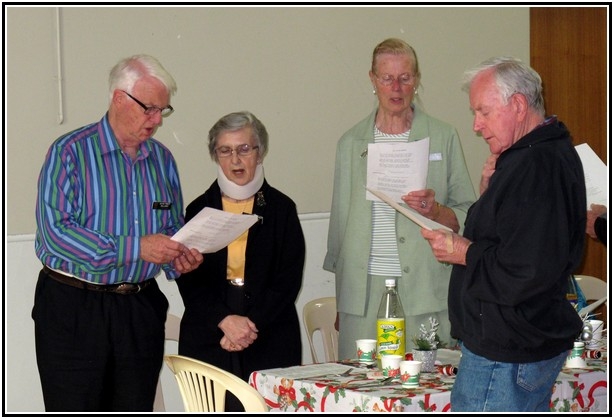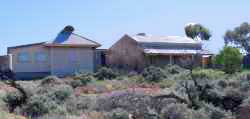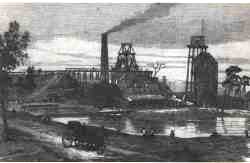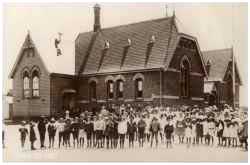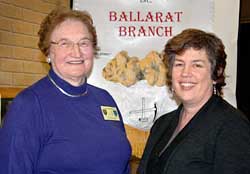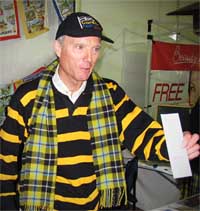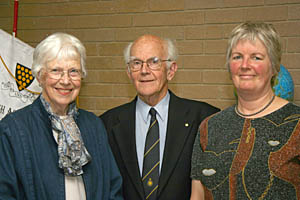|
Bill, his wife and niece
Helen
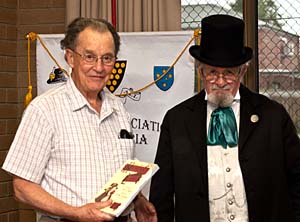
Our President with John Harrison
|
|
Christmas
2011
47 people gathered at our Christmas
meeting on Saturday 3rd December 2011,
including the CAV President Neil Thomas
and his wife Marilyn, Secretary of the CAV
June Whiffin and the Patron of the CAV,
Bill Phillips with his wife Gwen.
It was good to have visitors from
Melbourne, Geelong and Bendigo join with
us, at our last meeting at St Cuthbert’s.
The Hall looked splendid with beautifully
decorated tables prepared by the Committee
Members.
As has become the norm for Ballarat,
through the generosity of members in the
provision of food, a sumptuous feast was
enjoyed by all.
There was rousing singing of “Trelawney”
and members enjoyed the community carol
singing, accompanied by Joy Menhennet on
the piano.
It was a wonderful evening of fun, fine
food and Cornish fellowship.
To view the gallery of images Click
Here
October
2011 Speakers
October’s meeting included two very
interesting talks.
The first by Robyn Coates detailed the
finding of a grave of a Cornishman in
outback SA at Beltana. Named Edward
Commins he had been born in Bodmin in 1844
and died in 1881. Robyn showed and
explained how she had used the internet to
discover more of Edward’s life including
when and where he was born, where he went
to school, his marriage, his appointment
as Clerk of Courts at Beltana and his
subsequent death.
The second speaker was the Patron of the
Cornish Association of Victoria, Bill
Phillips.
Bill’s topic was, ‘The Almost Forgotten
Town of Timor’ which was located about 11
kilometres from Maryborough, on the
Dunolly Road.
Timor (Tie-more) had several names –
Chinaman’s Flat, Cox Town, and Bowenvale,
(named after the Governor who once visited
Maryborough).
In the late 1800s, Timor had a population
of 27 000 and was a thriving town with
churches, hotels, schools and shops as
well as the mines in the area.
Bill shared information about the various
mines that had operated and included
photos of trips undertaken with the
Ballarat Branch of the CAV.
Timor is no more but the local school and
cemetery still bear the name.
A wonderful high tea and fellowship
followed.
August
2011Speaker
Following a rousing rendition of
‘Trelawney’, members heard of the recent
travels of member Barbara McDonald to
Cornwall (and other parts of the UK), in
our Cornish Spot.
Growing up in the UK, Barbara was
evacuated to St Issey in Cornwall during
WW2 and settled in Australia in 1950. She
was able to locate her father’s and
grandfather’s graves and visited her
former Primary School at St Issey. Barbara
shared with us some of the stories
associated with both her and her late
husband’s family including one who was
hanged, drawn and quartered and one who
was transported to Norfolk Island as a
convict.
Clare Gervasoni, the curator of Art and
Historical Collections at Ballarat
University, was our speaker and she gave
us an interesting and informative talk
about the Ballarat School of Mines. As the
first School of Mines in Australia, it had
a world wide reputation for excellence.
We heard of former scholars with a Cornish
Heritage – Robert Malachy Sergeant, Henry
Richard Caselli, Samson and William Keast,
Thomas Bath, John Rowe, Edith Curnow and
her daughter Val Lawn (Val D’Angri - a
current member).
Claire presented the group with a book on
the history of the School of Mines.
June 2011
Speaker
Neil Thomas, President of the CAV, was the
speaker at the June meeting following the
AGM where all office bearers were
re-elected.
Neil spoke about the proud independent
Cornish village, Newlyn, noted for the
voyages of the “Mystery” in 1854 and “The
Spirit of Mystery” in 2008.
A lesser known voyage was that of the
lugger, “Rosebud” in October 1937, which
sailed from Newlyn to Westminster pier,
London, to protest against the Penzance
council’s plan to demolish old houses in
Newlyn and replace them with council
flats, at the top of a hill away from the
harbour.
The petition was partially successful.
The Star Inn, noted for the meeting place
of the “Mystery” sailors survived as well
as a number of houses used to accommodate
returned servicemen after W.W. II.
The Newlyn school of artists also
supported the retention of the heritage
buildings, many of which, together with
fishing boats, feature in paintings held
in art galleries, including Geelong and
Bendigo.
April 2011
Speakers
Dr Bill Pryor was the guest speaker.
Training as a Vet and with a variety of
employment in both Australia and overseas,
Bill returned to Scotsburn and was elected
to the Buninyong Council in 1987.
This followed a family tradition in local
government as his grandfather had been
Mayor of Ballarat on three
occasions.
From there began a journey resulting in
the establishment of the University of
Ballarat, officially opening in 1994 with
Geoffrey Blainey as the Chancellor and
Bill as the Vice Chancellor. It was
the sharing of highlights of this journey
that made the subject of his presentation.
Val D'Angri preceeded Bill's address with
a short Cornish segment on some of the
history of her Lawn family.
Mr John Harrison,
apothecary at Sovereign Hill, was the
entertaining speaker at the February
meeting.
On the Goldfields, an apothecary was
called upon to treat a variety of
medical conditions and disorders using
concoctions made from plants and herbs
and also ready made remedies.
These included coughs and colds, dropsy,
rheumatics, women’s problems, treatment
of wounds and injuries as well as
repelling witches!
An apothecary trained for 6 to 7 years
and was also able to make insect
repellent, snuff, dyes, soaps, tonics
and purgatives.
Members were able to remember some of
the remedies offered:
Dr Hollaway’s Pills (which cured from A
to W – ague to weakness); Dr Morse’s
Indian Root Pills (made from Indian
sarsaparilla); Syrup of Figs and
Beechams Pills.
Other less well known preparations were
Mariani’s Coca Wine (made from wine and
cocaine); Seven Sutherland Sisters Hair
Grower (one of the ingredients being
hydrochloric acid); Cocaine Tooth drops,
and Opium preparations with alcohol to
soothe coughs, teething and
sleeplessness in babies!!
John produced a variety of herbs and
plants from his basket of bags and had
everyone guessing as to what the plant
was and what it could be used for.
It was a most enjoyable session and
ended all too soon.
In the second half of our meeting, Joy
Menhennet shared with us some
information about Rev. William James
Palamountain, who was born at Little
Bendigo, near Ballarat in 1864. William
Palamountain entered the ministry of the
Methodist Church in 1886, and served in
various circuits He was a noted
evangelistic preacher and the
establishment of Epworth Hospital in
1921 was the result of his vision.
Joy read to us an article, ‘Memories of
Little Bendigo – Some Cornish
Personalities’, written by William
Palamountain and printed in the Argus on
20th May 1933.
|
|
|
|
|
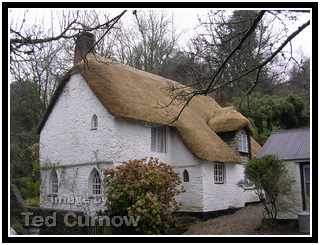
Images chosen by 
|
|
|
|


